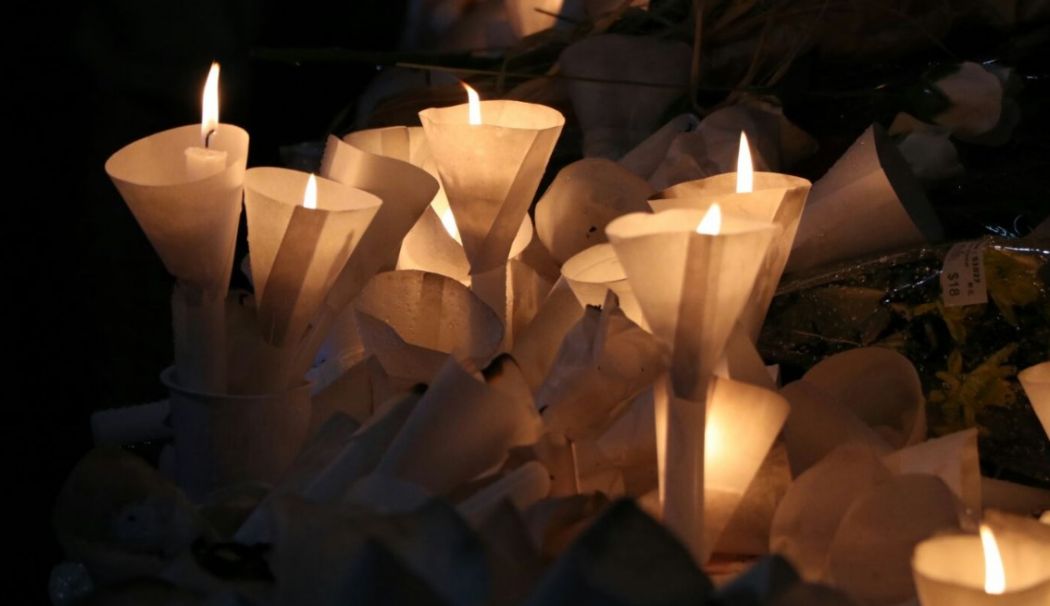Hundreds of Hong Kong supporters rallied to commemorate the late Chinese poet Liu Xiaobo as a symbol of resistance on Friday, a year after his death from liver cancer in Chinese custody.
Former lawmaker Lau Siu-lai told HKFP: “Liu Xiaobo means willpower, sincerity, perseverance for democracy, which we should show respect to.”

Liu was jailed for 11 years in 2008 for inciting “subversion of state power” after he penned Charter ’08 – a manifesto urging democratic reform. He was awarded the Nobel Peace Prize in 2010, but became the first laureate to die in custody since 1939. His widow Liu Xia was kept under de facto house arrest for eight years, until Tuesday when she was allowed to board a plane to Germany.
Sacrificed for democracy
Attendee Ada Chan said that when she heard the news of Liu’s death a year ago, she rushed from work to a vigil at the China Liaison Office: “It was sudden and very sad,” she told HKFP. “He sacrificed so much for democracy.”
The vigil – last year, and on Friday – was organised by the Hong Kong Alliance in Support of Patriotic Democratic Movements of China.

Ms. Chan, a retiree, brought white chrysanthemums for Liu Xiaobo, placed in the back of her wheelchair: “I hold him in high esteem, so even though it was hard for me, I had to come.”
She said Liu’s work held meaning for Hong Kong. “The spirit of his Charter ’08 is actually very suitable for Hong Kong. If we can fill ourselves with the spirit of justice he wrote about in Charter ’08 then Hong Kong will have a future,” she said. Chan added that she admired the society of freedom, justice, and rule for the good of the people that Liu advocated in his writing.
Qin Yongmin
Student Cecile Poon said that she was also shaken by his death: “It was a shock for me at the time,” she told HKFP.
“For Liu Xiaobo and other people fighting for democracy in China, we should pay very special attention to them and remember what they did because they not only are fighting a very non-democratic government, but they are giving us an example to follow. I want us to remember what they did for us.”
When asked about Chinese activist Qin Yongmin – who was sentenced to 13 years in jail for “subversion of state power” on Wednesday – Poon told HKFP: “I hope he won’t be like Liu Xiaobo and die in prison.”

Beijing has become increasingly intolerance of dissent by jailing activists, often under the subversion charges – notably used during the “709 crackdown” on human rights activists and their legal aids in 2015.
A prisoner of conscience
Former lawmaker Leung Kwok-hung said that the poet has become a symbol of the struggle for democracy in the mainland: “Liu Xiaobo is one of the most important martyrs for the cause of democracy in China,” he told HKFP.
“I think it is very important to pay homage to him so that more people can understand and emphasise his spirit of peaceful civil disobedience.”

Leung also said that although Liu’s widow Liu Xia is no longer in Beijing, he believes that she does not have absolute freedom: “To an extent, she is physically free – but her mindset, her conscious, is still hostage to the Beijing regime because her younger brother is still under house arrest.”
Liu Hui – younger brother of Liu Xia – remains under Chinese custody, after having been convicted of fraud in 2013 and sentenced to 13 years in prison. Liu Xia’s friend Liao Tianqi said on Thursday that she would not attend Friday’s memorial in Berlin for her late husband, as long as her brother is in China.
‘Humanitarian’ act
Democratic Party lawmaker Lam Cheuk-ting said that the release of Liu Xia was a result of global pressure: “This is about the international community putting pressure on the Communist Party of mainland China,” he told HKFP.

“[She] hasn’t been convicted of any offences, she was put [under] home arrest for so long – the only offence of hers was being the wife of Liu Xiaobo – it is absurd,” the lawmaker added.
Chief Executive Carrie Lam said on Tuesday that Liu Xia’s release was an “act of humanitarianism” – prompting criticism from lawmaker Claudia Mo who said the statement was impertinent.
Lam Cheuk-ting told HKFP in response: “If that is the case, Mrs Carrie Lam should have urged the central government to release all the political prisoners immediately and let mainland China become a country that respects human rights and basic freedom of people.”
Police presence
Kimberly Fan, a teacher whose father was in Beijing during the 1989 Tiananmen Square massacre, said that Liu stands for resistance against mainland authorities: “You have people who are not doing anything, just writing, and you can separate him and his wife for so many years.”
“To me, China won’t change until the communist government is gone.”
She also questioned the police presence at the event: “This is a peaceful assembly, why are there so many police with all their weapons? This is not the Hong Kong that I know,” Fan told HKFP.
But Fan said that she remains determined: “The future is on your side. If you have the chance to speak up, how can you not? In a year we might lose everything.”
